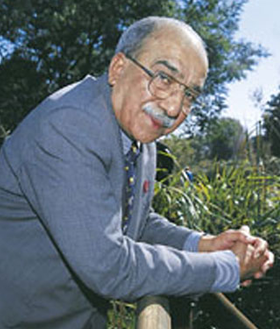heading
2000: Kader Asmal, South Africa
Kader Asmal is the law professor who in 1998 rewrote his country’s water laws, having already paved the way for a range of water reforms that would benefit the poor black population of South Africa, and not only the rich, mostly white community. In his action plan, Professor Asmal linked water issues in a natural way to the three key concerns of his efforts in earlier years: human rights, social justice and environmental sustainability.

In 1994, when he was offered the post of Minister of Water Affairs and Forestry in the government of Nelson Mandela, an estimated 16 million South Africans were without clean drinking water. Since then, ten million have gained access to water in the vicinity of their homes or at their schools or workplaces.
These advances are due in large part to the efforts of Kader Asmal. Professor Asmal was entrusted with the task of developing an action plan to solve the serious water problems facing South Africa, including unequal access to water. Energetically, he set about a comprehensive overhaul of existing water management policy and practice. Asmal already had considerable experience of major organisational reforms, among other things working for Mandela on the country’s new constitution as a member of the African National Congress’s negotiating team.
Kader Asmal’s initiatives include the Working for Water Programme, the Community Water Supply and Sanitation Programme, and the National Water Conservation Campaign. By the end of 1998, the Working for Water Programme involved 24,000 people in over 300 projects across the country, the aim being to clear alien plant species that are major consumers of water and threaten biodiversity. The Community Water Supply and Sanitation Programme, initiated to ensure health for all South Africans, has employed 300,000 people, mostly women.
Now, with the National Water Act of 1998, South Africa’s water can no longer be politically misused to fuel racial segregation. The new law is sometimes described as the world’s most comprehensive and visionary piece of water legislation. It incorporates a ‘water reserve’ concept that puts human needs and basic ecological functioning before commercial or industrial interests. The Act also includes water-use rights, an economic instrument which allows the poor pay what they can afford, while forcing water-intensive industry and agriculture to pay more. In addition, the legislation drafted by Kader Asmal states that neighbouring countries are to have an equitable share of water from shared rivers.
Professor Kader Asmal, a South African teacher and lawyer who trained and worked in Britain and Ireland during his 27 years in exile, is internationally renowned as a human rights scholar and activist. He served as chair of the World Commission on Dams, which had the goal of developing international ethical standards and guidelines for all parties interested in large dams. The Commission’s work has had a far-reaching influence on the dams debate and on water utilization and sustainable development in general. Another important task for Professor Asmal, in a world that has seen the construction of some 40,000 dams more than fifteen metres high.
In 1999, when the African National Congress was re-elected to government, Professor Asmal became South Africa’s Minister of Education under President Thabo Mbeki. Since then, he has retired as Minister of Education but has remained as a Member of Parliament. He has chaired the UNESCO negotiation forum discussing a draft convention on cultural diversity. In 2005, he was elected as president of the Financial Action Task Force. He continues to write on water and educational matters and lectures on these topics internationally.